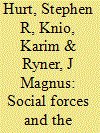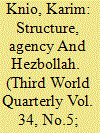| Srl | Item |
| 1 |
ID:
095182


|
|
|
|
|
| Publication |
2010.
|
| Summary/Abstract |
The literature on governance has recently witnessed a growing tension between a techno-managerial account of governance and a power-sensitive approach. This article argues that the downgrading of power relations by the techno-managerial approach is significantly problematic and counterproductive. Building on the case of the Euro-Mediterranean Development Bank, the article shows how the EU's articulation of the techno-managerial approach has had serious negative implications. On the one hand, it re-emphasised the embedded long-term power asymmetries that have characterised the EU's general governance attitude relationship with its Mediterranean partners. On the other hand, it compromised the credibility of EU policies in addressing and pressing for further reforms in the Mediterranean region.
|
|
|
|
|
|
|
|
|
|
|
|
|
|
|
|
| 2 |
ID:
089135


|
|
|
|
|
| Publication |
2009.
|
| Summary/Abstract |
This article addresses the consequences of Washington Consensus and more recently post-Washington Consensus policy for democratic good governance in Africa. It acknowledges the increased focus in recent years of policy-makers on poverty as an important force in world politics. Despite this increased concern the authors argue that International Relations as a discipline fails to offer a suitable framework for understanding poverty as a social force. The article proposes a revival of Robert W. Cox and Jeffrey Harrod's approach based on 'patterns of social relations of production'. This offers a disaggregation of the condition that is often referred to in the literature as 'the poor' or 'the informal sector'. The article then outlines a comparative research agenda based on the cases of Tunisia and South Africa. It demonstrates how these cases provide the sternest test for assessing the authors' scepticism of the prospects of reconciling market-led development with good governance, whilst also offering a 'most-different' comparison given their very different political cultures. In conclusion, the article reflects on the methodological aspects to operationalising such a research agenda and proposes an ethnographic approach informed by the work of Burawoy.
|
|
|
|
|
|
|
|
|
|
|
|
|
|
|
|
| 3 |
ID:
123526


|
|
|
|
|
| Publication |
2013.
|
| Summary/Abstract |
The role and nature of Hezbollah's involvement in Lebanese politics has been an omnipresent topic in Middle Eastern studies. The recent 'Arab Spring' uprisings further accentuated this complex role, given the party's support for every single popular resistance movement in the Arab world, with the exception of Syria, its major political ally in the region. This stark contradiction highlights once again the question of how far Hezbollah should be perceived as a proxy client of both Iran and Syria or whether it represents an intrinsic and genuine local resistance movement. In this article I argue that scholarly treatment of Hezbollah's nature, which has oscillated between structure-led, agency-led and dualistic types of analyses, is problematic. The article proposes a historically situated dialectical analysis of structure-agency which can potentially explain better how a legitimate social force can still be understood within the premises of proxy client politics.
|
|
|
|
|
|
|
|
|
|
|
|
|
|
|
|